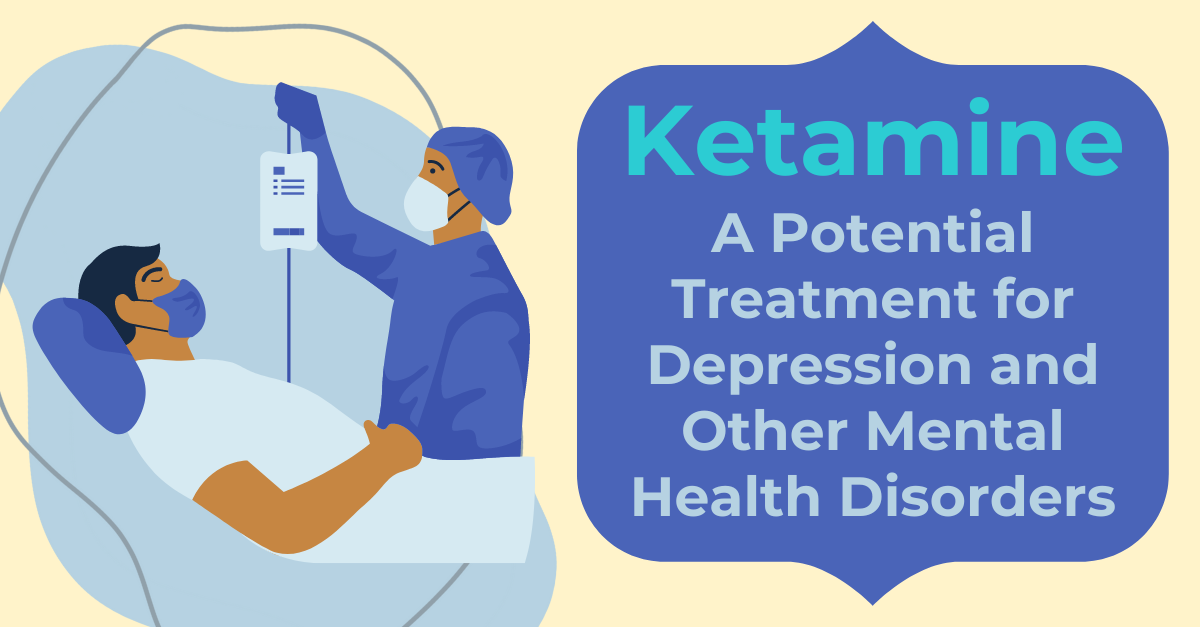October 21st, 2022

In recent years, ketamine has been making the headlines as an effective treatment to help individuals suffering from depression. You may have also heard varying reports about its use ranging from it being a horse tranquilizer, a street drug, a treatment for chronic pain, and something used during surgical procedures.
Well, let’s check out all of the above and get to learn more about ketamine, its potential use, and why some researchers have heralded the substance as the “biggest breakthrough in depression research in a half-century.”

Worldwide, ketamine is one of the most common analgesics and anesthetic drugs used today. It is prominently listed on the World Health Organization’s Essential Medicines. Since it was synthesized to its current form in the 1960s, it first became an important medicine to treat soldiers during the Vietnam War. Since then, it has been commonly used in ICUs, emergency rooms, surgical environments, and in diagnostic procedures.
It’s also been used effectively to treat several chronic pain syndromes including fibromyalgia, migraines, and skin burns. Given the ongoing opioid crisis and the fact that ketamine has moderate to low potential for physical and psychological dependence, it’s become a critical alternative for burn patients or chronic pain sufferers who may require multiple treatments or administrations without the risk of opioid addiction.
Associated with most medicines are, of course, their side effects. Ketamine is no different. However, near the turn of the century, clinicians began to notice an interesting side effect from patients who were being treated with ketamine during their medical procedures. Patients were also seemingly experiencing a significant decline in their depressive symptoms following their hospital stays. Continued research eventually found that independent of feeling better about their health problems, ketamine demonstrated its efficacy in temporarily reducing depression and other psychiatric disorders.
Over the last decade, research has highlighted its therapeutic utility and its implications in psychiatry and psychology. And while its application is still not broad enough to treat all symptoms related to depression, the field has started to take notice. As a medicine, ketamine is considered a highly effective antidepressant medication, but as a viable psychotherapeutic alternative, ketamine is just now starting to find a home.
Many clinicians are unaware of its benefits, how to best incorporate it into treatments, or how to administer it. Its stigma as a “street drug” has also made researchers, providers, and patients hesitant about its potential use. There is a dearth of knowledge about how it works in a psychotherapeutic environment and who may best benefit from it.
At the same time, there are many ketamine pain clinics now offering it as “mental health treatment”, without fully understanding the diverse psychological aspects associated with altered states, dependence, or its proper integration.

The majority of research surrounding the effects of ketamine has focused on depression. As one of the most common psychiatric disorders, depression is normally treated with psychotherapy and/or psychopharmacology. However, when some of these treatments do not work, the individual may have treatment-resistant depression (TRD). Ketamine has become an important alternative for those who have simply not benefited from traditional options.
In addition, when symptoms of depression become severe, some individuals may turn to suicide. Because most used antidepressants often take weeks or months to properly work and psychotherapy can also take time, those individuals suffering from severe symptomology may struggle to find quick and effective relief.
Most individuals who have taken ketamine report their depressive symptoms “lift” within hours of administration. In the days and weeks following treatment, patients may curb suicide ideation or allow the necessary time for the effects of for traditional antidepressants to take effect. Unfortunately, ketamine’s mood-boosting effects are only temporary, and therefore lasting relief may require the return to traditional methods. While many have benefited from multiple ketamine treatments, the long-term effects of continued ketamine use are still largely unknown.
More recent techniques have incorporated relatively higher doses to treat a wide array of psychiatric conditions including anxiety, obsessive-compulsive disorder, and post-traumatic stress disorder (PTSD). As of 2018, there were approximately 70 ongoing studies to explore ketamine’s efficacy in treating psychiatric disorders. Many clinics have already started to implement ketamine into their treatment plans for depression.
Ketamine is primarily administered intravenously, although an intranasal esketamine (S-ketamine) spray and lozenges have also made their way to the market. Ketamine reduces the presynaptic release of glutamate and acts as an uncompetitive antagonist of the glutamatergic N-methyl-D aspartate (NMDA) glutamate receptor.
The NMDA receptor plays an important function in the development and maintenance of pain. However, when ketamine is introduced, it effectively blocks the binding of glutamate, our body's main excitatory neurotransmitter. Thus, when pain is normally experienced, the receptors in the brain are unable to fully receive and transmit signals relating to pain. Ketamine can also bind to NMDA receptors on GABAergic neurons where the inhibitory neurotransmitter Gamma-aminobutyric acid (GABA) is released. The production of GABA essentially slows the neuronal activity in the brain and helps us calm down.

In the coming years, it is likely that ketamine will continue to increase in popularity. It is clear that many individuals will find timely relief through ketamine. Researchers, psychotherapists, and psychiatrists will also begin to gain a better understanding of its utility and how to best incorporate it as a treatment. This will include ketamine-assisted psychotherapy to help individuals prepare and process their experiences into more meaningful healing opportunities.
While ketamine has already demonstrated effectiveness under certain conditions, some of the surrounding aspects including education, training, research, delivery, and the marketing of ketamine may still feel like the Wild Wild West. In due time, many in the field are still hopeful that ketamine’s trajectory honors and prioritizes quality of care.
Written by: Max Riv, MS.
At Clarity Clinic, we have highly trained staff who specialize in therapy and psychiatry services. To learn more about how we can support your mental health, call Clarity Clinic at (312) 815-9660 or schedule an appointment today.

Our Services
Virtual/Online CarePHP and IOPAdult PsychiatryChild & Adolescent PsychiatryAdult TherapyChild & Adolescent TherapyCouples CounselingFamily TherapyGroup TherapyPsychological TestingTranscranial Magnetic Stimulation (TMS)Resources
Refer a PatientCareersClinical Training OpportunitiesOur ProvidersFree Mental Health TestsCommonly Prescribed MedicationsLocationsBlogIn The NewsClarity Through CharityClarity for AllQuick Links
Patient PortalFAQsAccepted InsurancesContact us